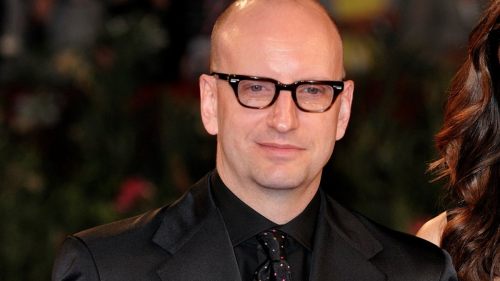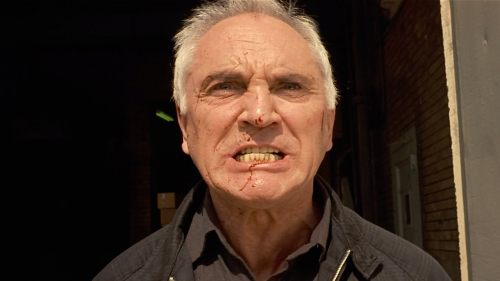Interview: Joshua Leonard Goes UNSANE for the iPhone
Actor Joshua Leonard has had plenty of experience with digital cameras being trained on him, ever since his debut in 1999’s The Blair Witch Project. But it’s still news when a general-release feature is made with an iPhone, especially if the director is a heavy hitter like Steven Soderbergh, who used the device to shoot his psychological thriller Unsane (opening Friday).
“There’s a lot of discussion going around based on the fact that it was shot that way,” Leonard acknowledges, “because it’s still a bit of a novelty. Other than Sean Baker’s Tangerine, I think this is the only film to get a lot of exposure that’s been shot on an iPhone. That said, the shooting medium isn’t a conceit of the movie, and if we weren’t talking about the fact that it was made that way, two minutes into watching Unsane, you wouldn’t even think about it. The iPhone 7 shoots in 4K native, so it gathers the same amount of data as the Alexa or RED cameras. It’s a very different time technologically, and I hope it opens the door to a bunch of other interesting films, because we’ve reached that point where there are no excuses not to make a movie.”
Unsane casts Leonard as David Strine, whose stalking of a young woman named Sawyer Valentini (Claire Foy) has forced her to move from Boston to Pennsylvania, where she is tricked into committing herself to a psychiatric treatment center. One of the orderlies who dispenses her meds looks identical to David, and the movie pivots on the question of whether he has followed her to the hospital, or her paranoia has her seeing things. Soderbergh, working from a script by Jonathan Bernstein and James Greer, stages a number of tense close-quarters encounters between Sawyer and David, and Leonard cites the unobtrusiveness of the filming gear as a major advantage.
“This is one of my favorite movies I’ve ever done, in terms of the process of making it,” he says. “Steven Soderbergh has been a hero of mine for well over 20 years, since before I ever worked in film. In our first conversation about the role, one thing he said was, ‘If this technology had existed when I was 15, it’s all I’d be doing with my time.’ I loved the idea of playing a part in this experiment by a filmmaker who I held in such great esteem. One reason I always like coming back to smaller films is that something magical can result when you remove the distance between impulse and execution. You’re not going to use this technique to make Dunkirk, but it’s great for the right project, because you’re never waiting around. From the time we first showed up on set for Unsane till the time we wrapped, it felt like we were doing one continuous thing; we got to stay in character.
“Part of what’s so exciting about making a film on the iPhone,” he continues, “is that it’s this omnipresent piece of technology we’re all used to, so that removes the self-consciousness that comes with being on camera. It’s no longer Film with a capital F. The phone takes up so much less space in the room that it’s helpful just from a psychological standpoint. Susan Sontag once wrote about how a camera is like the barrel of a gun, and while other actors might not notice the camera, for me there’s always that sense of trying to forget it’s there. It’s this big piece of equipment with a big lens pointed at you, and it takes up so much real estate. With the iPhone, you really can forget about it. Some of the scenes in Unsane were me, Claire, Steven with the iPhone and a sound guy in the room, just the four of us, so as Steven has said, it felt like going out in the backyard and making something with your buddies when you were a kid, because we were that light on our feet.”
Leonard has become a familiar face in indie cinema like Lynn Shelton’s Humpday and his own directorial effort The Lie among many others, and in scare fare as well, from TV’s Bates Motel to the culinary-revenge feature Bitter Feast, produced by Larry Fessenden (for whom he just wrapped a role in the Frankenstein variation Depraved). Yet he’s initially unrecognizable as the doughy, heavily bearded David, and he remembers, “It was funny, because when I got the call about this role, I had recently finished about six months of writing and postproduction on two of my own projects, and had gained some weight. Then I realized I was going to have to get back into acting, and had started an exercise regimen, was eating healthier and feeling really good. Then Steven asked me to play David, and said, ‘Oh, by the way, I need you to put that weight back on!’ [Laughs] He was very clear that he wanted David to be a couch potato who didn’t have much of a social life, who certainly didn’t have a dating life, and was at home obsessing about Sawyer a lot of the time. So I let the beard grow, let the stomach grow and didn’t go out in the sun.”
He goes on to admit that playing such a fixated individual came somewhat naturally to him. “I have been known, in my time, to be an obsessive person, and most of my favorite people have tended to be obsessive about certain things, whether it be work or cracking the code on something or figuring something out. I also have the tremendous benefit of enough years of therapy under my belt to hopefully not inflict any obsessive tendencies on the people around me [laughs]!
“David has not availed himself of that,” Leonard adds. “I did a lot of thinking about teenage love and the terrible decisions you make, and how all-encompassing that is, and the way we see the world with blinders on that are dictated by our own hormones and limited perception of the world before we develop more moderate thinking, and the idea of what it would be like if someone didn’t grow out of that. What would it be like if you never lost the kind of obsession you have if you get emotionally stunted at 13? And then you add the intelligence of an adult person to this quality of Lenny in Of Mice and Men—the emotional maturity of a teenage kid but the body of an imposing man—and that becomes a dangerous combination.”



